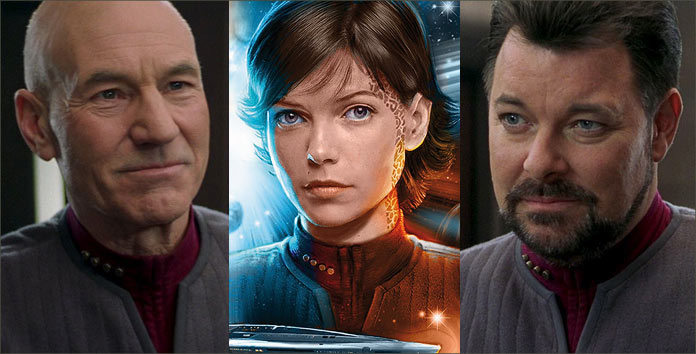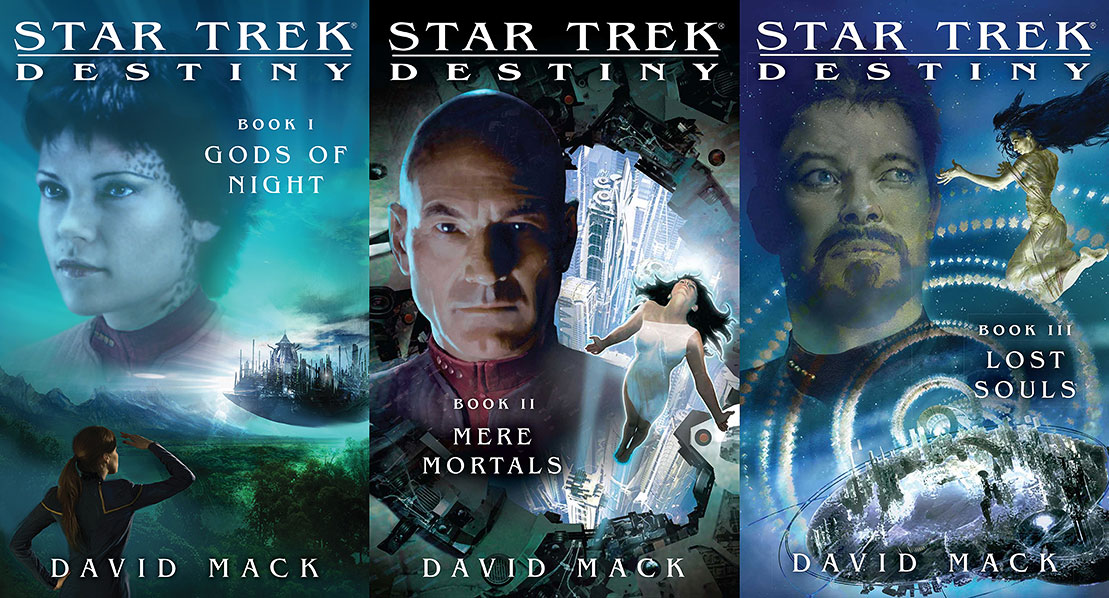Half a decade after the Dominion War and more than a year after the rise and fall of Praetor Shinzon, the galaxy’s greatest scourge, the Borg, returns to wreak havoc upon the Federation — and this time, its goal is nothing less than total annihilation.
Elsewhere, deep in the Gamma Quadrant, an ancient mystery is solved. One of Earth’s first generation of starships, lost for centuries, has been found dead and empty on a desolate planet. But its discovery so far from home has raised disturbing questions, and the answers harken back to a struggle for survival that once tested a captain and her crew to the limits of their humanity.
From that terrifying flashpoint begins an apocalyptic odyssey that will reach across time and space to reveal the past, define the future, and show three captains that some destinies are inescapable. For Captain Jean-Luc Picard of the U.S.S. Enterprise, defending the future has never been so important, or so personal — and the wrong choice will cost him everything for which he has struggled and suffered.
For Captain William Riker of the U.S.S. Titan, that choice has already been made — haunted by the memories of those he was forced to leave behind, he must jeopardize all that he has left in a desperate bid to save the Federation.
And for Captain Ezri Dax of the U.S.S. Aventine, whose impetuous youth is balanced by the wisdom of many lifetimes, the choice is a simple one: there is no going back — only forward to whatever future awaits them. . . .
We’re counting down to the impending return of Jean-Luc Picard by revisiting some of the pivotal stories about the beloved Starfleet captain from across the last three decades of Star Trek: The Next Generation published fiction.
Welcome to the next entry in our retro review series Prelude to Picard!
* * * *
The Star Trek: Destiny trilogy by David Mack – Gods of Night, Mere Mortals, and Lost Souls – is the best Star Trek story ever published in prose. A stunning achievement of audacious scale, I doubt anything will quite shake Destiny from the top spot of my all-time favorite Star Trek books.
And given that Star Trek: Picard looks to include some Borg elements in it, what better book to finish this series than with the Star Trek novels that gave us an origin story for the Borg, and a totally satisfying ending to the Borg arc?
It is highly unlikely that anything seen in this novel will become part of the Star Trek canon when Picard airs – just the fact that a Borg cube exists twenty years after Star Trek: Nemesis is incompatible with how Destiny ends – but this trilogy and the new show look like they are preparing to explore some similar themes and ideas.

With returning characters from The Next Generation, and the addition of Seven of Nine, in some ways, Picard is shaping up to be a 24th century Star Trek crossover. Destiny is the ultimate crossover for the continuity established in the novels, pulling together in three main strands (The Next Generation relaunch, the Titan series, and the Deep Space Nine relaunch): the USS Enterprise-E commanded by Jean-Luc Picard, the USS Titan commanded by William Riker, and the USS Aventine commanded by Ezri Dax.
In addition, the story has a Star Trek: Enterprise relaunch tie-in as well, with the inclusion of Captain Erika Hernandez and the NX-02 Columbia, who play an important role in the creation and ultimate destruction of the Borg Collective.
After years of attempting, and failing, to assimilate the Federation, the Borg return to Federation space with a new mission: its total annihilation. Arriving with overwhelming force and a singular mission, the Borg cut vast swathes of destruction across the Alpha and Beta Quadrants. David Mack has, over the years, earned himself the nickname “Angel of Death” among Star Trek novel fans, and nowhere is that title more deserved than in Destiny.
As the Federation struggles to mount a last stand and its losses mount, Picard, Riker and Dax find themselves in three corners of the galaxy unpicking a mystery that could be the Federation’s only hope. The mystery involves the fate of the Columbia two hundred years prior, which was discovered in the 24th century wrecked on a planet in the Gamma Quadrant.

Destiny is huge, spanning three books, three ships and crews, and cameos from across the pantheon of Star Trek literature that fold in established and original characters and take us from one corner of the Star Trek universe to the other.
Despite its galactic scope, however, the story never loses sight of the smaller character threads that it is interested in exploring; Riker and Troi’s difficulty conceiving a child, Erika Hernandez’s guilt over her decisions, Picard’s struggle to move on from the Borg, and Dax’s feeling out of place as a new captain on an important mission are just some of the character stories that play themselves out over the course of the book.
Many of these subplots build upon the previous books in their respective series. And given the grand sweep of Destiny and the galactic-level stakes, you might have forgiven Mack for setting aside some of those character stories. But it is to his credit that he does not. Through the small moments in which characters learn something about themselves or advance their relationships, the stakes for the wider story become both clearer and more poignant.
The Borg trying to wipe out the Federation is a huge story, but it would feel much emptier without the small stories that tie the characters together. For example, the resolution to the book is not as meaningful if we don’t experience every agonizing choice made by Hernandez from the moment her ship is attacked by Romulans to when it meets its tragic fate.

Perhaps the most interesting character arc in the novel, however, is Picard’s. Mack does not try and make Picard the ultimate hero of this trilogy. The final resolution is one to which Picard is largely a bystander to ideas generated and carried out by others. And while that might seem like an odd choice, it absolutely works within the context of this story.
Picard has always struggled to overcome his history with the Borg. The events of First Contact plainly show he is a deeply troubled man by his experiences. While that might not ultimately affect his judgement or his actions in his everyday life, when faced with the Borg it clearly does.
The possibility he is faced with, that all sentient life in the Federation is being exterminated, just as he has found happiness with Beverly and is building a family, is utterly soul destroying. More than any of the major protagonists of Destiny, Picard comes closest to giving into despair about the unstoppable nature of the Borg.

There are so many ways this story could have gone wrong and fallen utterly flat on its face. And none more so than the decision to give the Borg an origin story. But the story, as it unfolds over the course of the three books and you come to realize with horror humanity’s role in the origin of their greatest enemy, works on every level.
Destiny gives the Borg a full arc, reconciles many of the more curious and contradictory elements of the race as seen on screen, and gives them an extremely satisfying send off. The book also deftly answers the question about why the Borg are so obsessed with Earth and humanity, in a way that feeds into the story’s emotional depth.
And in addition to giving us a full explanation of who the Borg are what motivates them, Destiny also succeeds in making the Borg scary again. Through the run of Voyager, there was a growing criticism that the Borg were becoming less scary and threatening, as they were defeated time and again. But the Borg of Destiny are a horror show, dialing up the creep factor and providing plenty of good reasons why the Borg should be feared.
As Star Trek novels transition away from developing their own continuity and back towards serving as companions for the current on-screen material, it is likely to be a long time before anything like Destiny happens again, if it ever does.
Destiny is the ultimate expression of confident storytelling from Star Trek authors given a free hand to chart a course for the characters and stories we love so much. And while the Star Trek canon may go in a totally different direction with what it tells us about the Borg, Destiny will remain an excellent trilogy and totally worth your time.
If Star Trek: Picard finds a way to be even half as good as the Star Trek: Destiny trilogy, we’re in for a real treat.

